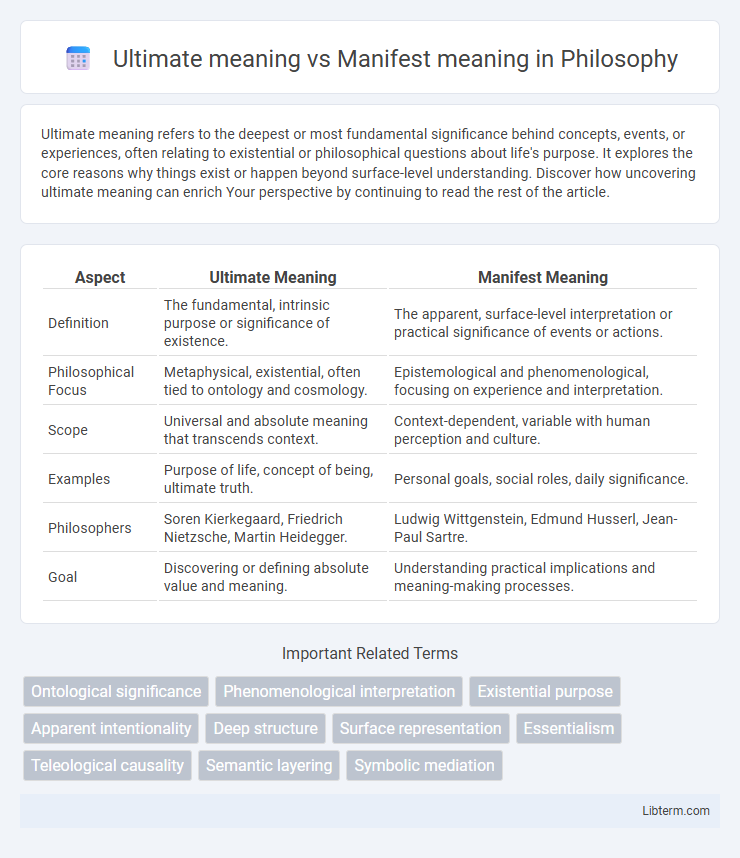Ultimate meaning refers to the deepest or most fundamental significance behind concepts, events, or experiences, often relating to existential or philosophical questions about life's purpose. It explores the core reasons why things exist or happen beyond surface-level understanding. Discover how uncovering ultimate meaning can enrich Your perspective by continuing to read the rest of the article.
Table of Comparison
| Aspect | Ultimate Meaning | Manifest Meaning |
|---|---|---|
| Definition | The fundamental, intrinsic purpose or significance of existence. | The apparent, surface-level interpretation or practical significance of events or actions. |
| Philosophical Focus | Metaphysical, existential, often tied to ontology and cosmology. | Epistemological and phenomenological, focusing on experience and interpretation. |
| Scope | Universal and absolute meaning that transcends context. | Context-dependent, variable with human perception and culture. |
| Examples | Purpose of life, concept of being, ultimate truth. | Personal goals, social roles, daily significance. |
| Philosophers | Soren Kierkegaard, Friedrich Nietzsche, Martin Heidegger. | Ludwig Wittgenstein, Edmund Husserl, Jean-Paul Sartre. |
| Goal | Discovering or defining absolute value and meaning. | Understanding practical implications and meaning-making processes. |
Defining Ultimate Meaning
Ultimate meaning refers to the profound, overarching purpose or significance that gives life a sense of direction and fulfillment beyond immediate experiences. It contrasts with manifest meaning, which pertains to the surface-level, explicit interpretations or outcomes perceived in daily events. Defining ultimate meaning involves exploring existential questions about the nature of existence, values, and the enduring goals that shape human understanding and motivation.
Understanding Manifest Meaning
Manifest meaning refers to the explicit, surface-level interpretation of a text or symbol, which can be directly observed and easily understood by an audience. Understanding manifest meaning involves recognizing the clear, obvious messages or intentions conveyed without requiring deep analysis or inference. This clarity contrasts with ultimate meaning, which delves into the underlying, often abstract significance or the broader implications beyond the immediate content.
Core Differences Between Ultimate and Manifest Meaning
Ultimate meaning refers to the fundamental, inherent significance or purpose that underlies existence or a concept, often philosophical or spiritual in nature. Manifest meaning, by contrast, is the explicit, observable interpretation or expression of that ultimate meaning in everyday experiences, symbols, or behaviors. The core difference lies in ultimate meaning representing deep, abstract truths, while manifest meaning reflects tangible, practical representations accessible to human perception.
Historical Perspectives on Meaning
Historical perspectives on meaning distinguish ultimate meaning as the profound, existential purpose sought beyond immediate experience, rooted in philosophical and religious traditions. Manifest meaning refers to observable, practical significance derived from everyday contexts, emphasizing concrete and functional interpretations. This distinction has shaped debates in hermeneutics, with thinkers like Heidegger and Wittgenstein exploring how ultimate meaning underpins human existence, while manifest meaning governs linguistic and social interactions.
Philosophical Foundations of Ultimate Meaning
Ultimate meaning in philosophy refers to the fundamental purpose or significance that underlies existence, often connected to metaphysical or existential realities, whereas manifest meaning pertains to practical, surface-level interpretations found in everyday experiences. Philosophical foundations of ultimate meaning explore questions about the nature of being, the cosmos, and human purpose, drawing from existentialism, metaphysics, and theology to uncover intrinsic value beyond empirical phenomena. Concepts such as Heidegger's "Being-toward-death" and Kierkegaard's leap of faith illustrate efforts to articulate ultimate meaning as a transcendent grounding for human life.
Social and Psychological Roots of Manifest Meaning
Manifest meaning arises from social interactions and psychological needs, serving as the explicit, observable purpose or value attributed to experiences. It is deeply rooted in collective cultural narratives and individual cognitive processes that shape perception and identity within a social context. Unlike ultimate meaning, which pertains to transcendent or philosophical significance, manifest meaning functions as a practical framework guiding behavior and social roles.
Real-Life Examples of Ultimate vs. Manifest Meaning
Ultimate meaning refers to the profound, overarching purpose or significance behind an event or existence, while manifest meaning involves the immediate, observable interpretation. For example, a person volunteering at a shelter may manifest kindness and community support, but ultimately, their actions reflect deeper values of altruism and social justice. In environmental activism, manifest meaning includes protests and awareness campaigns, whereas ultimate meaning addresses the long-term goal of sustaining the planet for future generations.
Navigating Conflicts Between Ultimate and Manifest Purpose
Navigating conflicts between ultimate and manifest purpose involves recognizing that ultimate meaning represents the overarching, often abstract, reason for existence, while manifest meaning reflects the practical, immediate objectives and actions in daily life. Resolving tension requires aligning short-term goals with deeper values, ensuring that manifest purposes support the ultimate mission without compromise. Clear communication and reflective practices help individuals and organizations integrate these levels of meaning to maintain coherence and motivation.
The Role of Culture in Shaping Meaning
Culture profoundly influences the distinction between ultimate and manifest meaning by framing how individuals interpret life's purpose and everyday experiences. Ultimate meaning reflects deep existential beliefs shaped by cultural narratives, rituals, and values that provide coherence and significance to human existence. Manifest meaning, conversely, arises from concrete cultural practices and symbols that convey immediate, observable significance within specific social contexts.
Integrating Ultimate and Manifest Meaning in Daily Life
Integrating Ultimate meaning, which encompasses profound, existential purpose, with Manifest meaning, the tangible significance found in everyday experiences, enhances personal fulfillment and resilience. Practicing mindfulness and aligning daily actions with core values bridges these layers of meaning, fostering a cohesive sense of purpose. This integration supports mental well-being by connecting abstract philosophical insights with practical, lived reality.
Ultimate meaning Infographic

 libterm.com
libterm.com